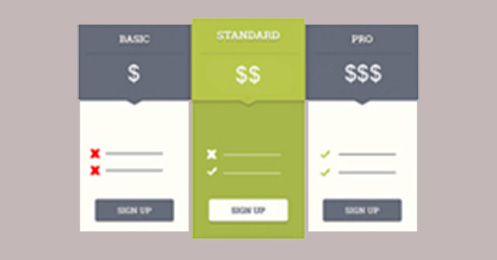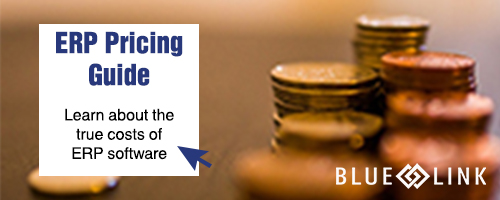Ever notice how it’s impossible to find pricing for accounting ERP software online? Have you ever filled out a “Request a Quote” form on a website expecting an email response, only to have a sales rep reach out to you by phone?
There is a specific reason why you can’t easily find pricing information online and that’s because the cost of accounting ERP software is complicated. Unlike introductory systems where information about different pricing options is readily available, true ERP systems are not a one-size-fits-all solution. Therefore, the cost will depend on several factors such as the number of users, business processes, specific requirements and existing systems and infrastructure. For example, a company with multiple locations that sells through online sales channels is going to have different requirements than a company that distributes strictly through sales reps across a handful of states. Even if both companies are wholesale distributors selling consumer packaged goods, their requirements, processes and even the experience and knowledge of their employees will significantly vary, resulting in different software needs and costs. For the most part, accounting ERP solutions for a specific industry (such as wholesale and distribution) will be able to address 70-80% of a business’ needs out-of-the-box. However, most vendors competing in the small-medium size business space will also provide optional components that companies can turn on or off depending on its specific needs – at an additional cost. A great example of this type of functionality is eCommerce. The ability to turn on or off built-in features is different from the ability to integrate with 3rd party applications, however, both typically involve additional costs.
Taking into account the above, it’s reasonable for an accounting ERP software vendor to need to speak with potential customers to gather information before being able to provide them with an idea of pricing. However, companies should never base the search for ERP software on costs alone. A good vendor will also take the time during phone discussions to learn more about a company’s specific requirements to first and foremost determine whether or not it would be a good fit – from a functionality and business culture standpoint. There are several other factors to consider which take priority over cost if you want to find the right solution for your business.
As the first step in searching for a new system, it is important to have a good understanding of your company’s processes and requirements as this will help vendors determine and make recommendations on key functionality. This information will help you and the vendor determine if their solution is the right fit and allow the vendor to provide you with an estimate of costs based on your unique needs.
Before you reach out to vendors to get pricing information, consider the following:
Industry/Functionality Requirements
Most true accounting ERP solutions will provide the same basic features for inventory management, order entry and processing, warehouse management, general ledger, accounts receivable and payable and contact management. Therefore, it is important to consider other unique or industry specific requirements that will result in the need for certain functionality. What are some things your business does that gives you a competitive advantage? Do you need specific functionality to address these processes? Are you looking to grow the business and therefore your needs will be changing in the next couple of months? It’s rare that any type of software will able to meet 100% of your unique business needs out-of-the-box, but most will be able to provide optional features or custom work. As mentioned above, many ERP vendors provide optional components that a company can turn on or off to address specific needs, however, each of these will add to the cost of the system. Keep in mind that ERP is designed to be scalable as your company grows, allowing you to add additional features down the road.
Number of Users
Many vendors base the cost of their software around the number of users or software licenses. However, there may be different ways of accessing information in an ERP solution and therefore the number of users required may change from what you currently have. Some vendors also provide different pricing depending on the needs of the user or will have the same pricing with the ability to set different permissions and security settings for individual users or groups of users. The more information you can provide a vendor about who will be accessing the system, and what they will be doing, the more accurate pricing you will get. In general, the more users you have, the higher the costs.
Implementation
Trying to estimate and provide implementation costs is quite difficult for ERP projects, especially early on in discussions. The fact that some vendors provide set costs, while others charge by the hour, makes it even more difficult. Data migration and training costs tend to impact overall implementation costs the most but will depend on several different factors such as:
Training
- Are the same users going to be trained on multiple areas of the software?
- Do employees have experience using modern software solutions, or will there be a large learning curve when implementing new technology?
- Are employees willing to change and learn a new solution?
- How many people need to be trained? Typically, the more people being trained, the more work is involved. It tends to be easier to train a group of 5 employees than a group of 20.
Data Migration
- Is the data being moved from multiple systems and will it be in different formats?
- Is there a lot of data clean-up required in terms of old or bad data, duplicate records, formatting issues?
On-Premises or Cloud
Another factor which affects costs is whether or not you decide to implement a cloud-based/hosted solution or on-premises. Some vendors will offer both options in which case they will be able to guide you through the process of choosing the right solution for your business. From a cost standpoint, cloud-based solutions are subscription-based in that the vendor charges monthly license fees, whereas with on-premises all licenses are bought and paid for upfront. In addition, on-premises implementations require an up-to-date server and other hardware which can sometimes be an additional cost (and requires on-going maintenance from IT). With cloud-based solutions, hardware, server, and IT maintenance become the responsibility of the software vendor, with associated costs included in monthly fees.
As with any other large capital investment, implementing new software takes time and money – you wouldn’t purchase a new warehouse without first performing research and speaking with the appropriate people from your team and from the real estate industry. Before you begin your search for new software, make sure you’re in the right mindset – the right system should be a strategic investment for your company and not just a necessary evil. More advanced accounting ERP software will be able to better handle an increase in order and transaction volume, manage orders from multiple sales channels, increase automation and reduce the amount of time needed to enter data, and allow employees to focus on more meaningful work and less on administrative tasks. Set aside the time to have productive conversations with software vendors, as this will make the search and selection process easier.











